Before platforms like Microsoft Dynamics 365 CRM entered the scene, only large enterprises could dream of marketing automation. Only a few had the technical expertise and even fewer could afford these solutions, as they were mostly “in-house”.
Now, as many people use CRM software including MS Dynamics 365 for marketing automation, such solutions have become much more relevant and accessible. Yet, most people still don’t have a clear idea about what automation means for their company’s sales and profits.
To help you make better sense of this important business tool, this article discusses some of the crucial aspects of marketing automation, as well as the MS Dynamics 365 marketing tool – one of the MS Dynamics most popular modules.
What is Marketing Automation?
In general, marketing automation is the process enabled by software to automate repetitive tasks across marketing and sales departments, thus allowing marketers to create consistent and connected customer experiences. Primarily, it helps brands deliver the right content, at the right time, and to the right prospect. In turn, this generates greater trust, reliability, value, and visibility of your business. As a result, marketing automation tools such as MS Dynamics 365 enhance the productivity of your marketing efforts, thus ensuring better conversion rates and quality lead generation.
The Need for Marketing Automation
Imagine a growing business with hundreds and thousands of daily customer interactions. There is no such team that can manually handle all of this one-to-one for a long time. If you want to drive your business growth and increase its market coverage, marketing automation and CRM software are a must. They aim to automate your key sales and marketing activities, streamline workflows, and quantify tasks using valuable metrics.
So why exactly do businesses need marketing automation? What do they get? Here are only a few benefits a company gets:
- Interpreting customer engagement data more efficiently. When businesses have accurate data on their current state, they can use this information to boost sales by creating more customer-oriented and personalized campaigns. This involves precise targeting and better lead direction. For most parts, this also eliminates the need for expensive third-party services.
- Enhanced lead generation and increased customer conversion rate. In-built lead scoring systems allow sales representatives to generate and identify more leads that are likely to be converted into sales.
- Increased staff productivity. Your specialists no longer need to spend their time on routine and repetitive tasks as they are now fully automated and don’t require additional human resources.
- Sales and marketing goals are now better aligned. Your sales teams and marketing specialists should work as a single organism for the benefit of your business. Marketing automation software allows simplifying communication between these departments and aligns their key goals.
Over time, we have seen several software platforms and toolkits in this regard, each with its boons and banes. Of these, Microsoft Dynamics 365 CRM has emerged as one of the most popular, given some of its unique advantages over its peers. Its end-to-end solution offers the perfect harmony of CRM and business intelligence: the two foundations of modern-day business.
Apart from the user-friendly management processes, with Dynamics 365, customer engagement analysis has become seamless like never before. Implementing Dynamics 365 for marketing provides a complete toolkit for the successful and omnichannel execution of your campaigns.
Microsoft Dynamics 365 Marketing Features
Building stronger and more profitable customer interactions – isn’t this one of your primary business goals? If not, then it should be, and that’s where MS Dynamics 365 comes handy. Applicable across verticals, it’s purpose is to provide better customer experiences.
As such, the robust set of Microsoft Dynamics 365 marketing tools was designed for the service sector. Nonetheless, it can boost sales and productivity across industries. It ensures cross-category functionalities that business owners need pretty badly – efficient customer relationship management, as well as proper and uninterrupted supply chain management. However, the story doesn’t end here.
Marketing Segments
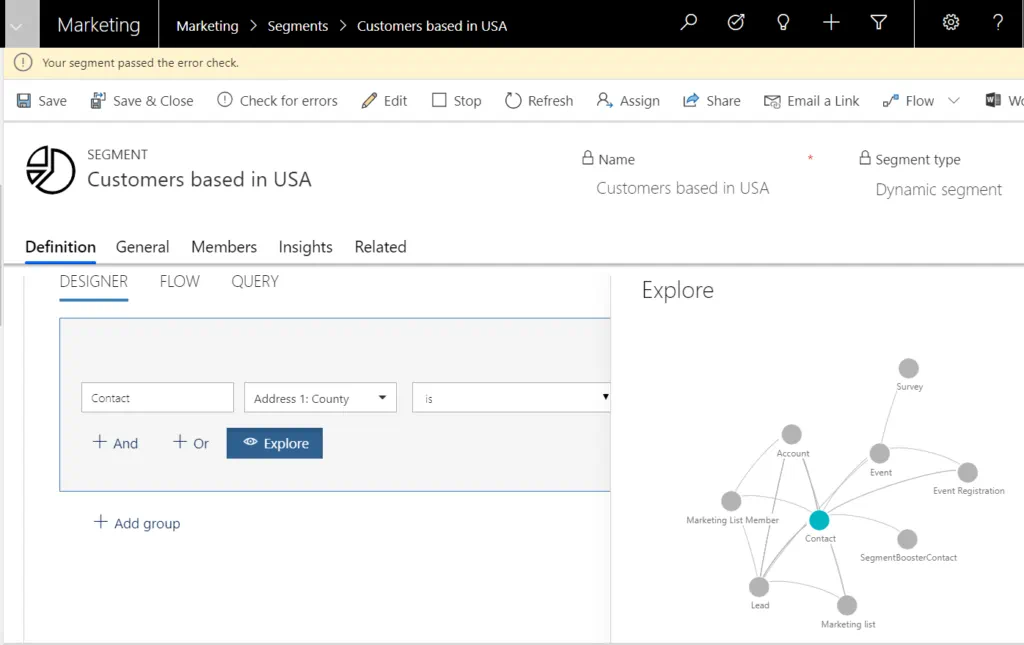
With Dynamics 365 Marketing, you can perform high-quality audience segmentation. Your prospect database can be broken down by such specific criteria as “clicked an email”, “attended an event”, etc.
Customer Journey
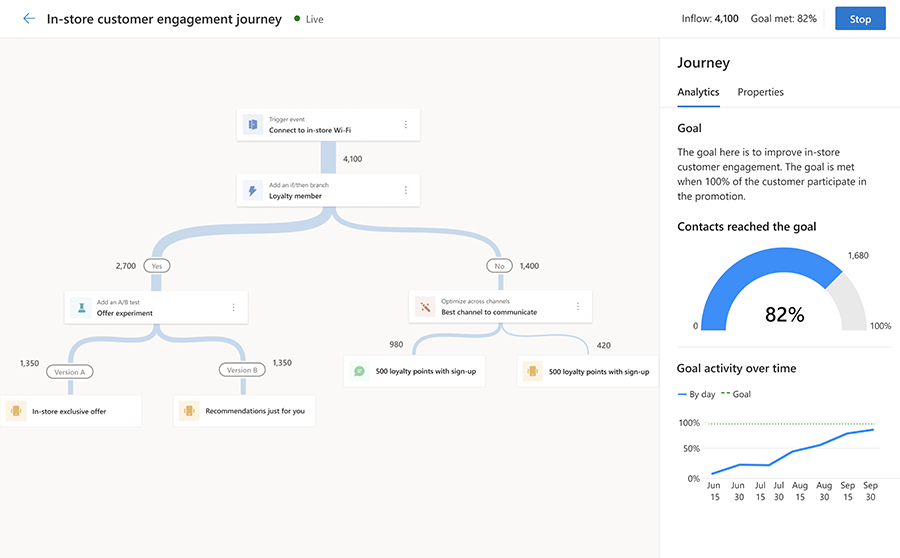
Dynamics 365 Marketing provides you with an intuitive drag-and-drop customer journey building solution. Each journey stage can be greatly customized and automated. For example, a system can send out an email to a customer upon triggering a specific action.
Email Marketing

Although Dynamics 365 Marketing enables an omnichannel approach to marketing, arguably its strongest department is email campaigns. You can set up customized email templates, and some of the email content will then change depending on the recipient (for example, recipient name/organization). On top of that, you can always preview how your emails will look across multiple devices before you send them out.
Scheduling Emails
Setting up email campaigns so that follow-ups are sent automatically is another Microsoft Dynamics 365 Marketing Feature. Send out emails at times that are convenient for the recipient and track the efficiency of such emails. Follow-ups can also be programmed to automatically trigger upon a specific action.
A/B Testing
Don’t hesitate to try out various subject lines or CTAs with the A/B testing capabilities the module provides. You can create multiple variations of marketing materials and send them out to different target audiences. The system will then choose the “winning” material based on the predetermined “winning metric”. Typically the winning metric is either open rate or click-through-rate, showing the level of engagement with your content.
Hard Bounces
Hard bounces are cases when emails don’t get delivered because of invalid email addresses. It’s almost inevitable that you will get at least a couple of those when sending out hundreds of emails to contacts in your database. Microsoft Dynamics 365 Marketing recognizes when hard bounces occur and automatically removes invalid contact data from the database to keep it as clean as possible.
Event Management
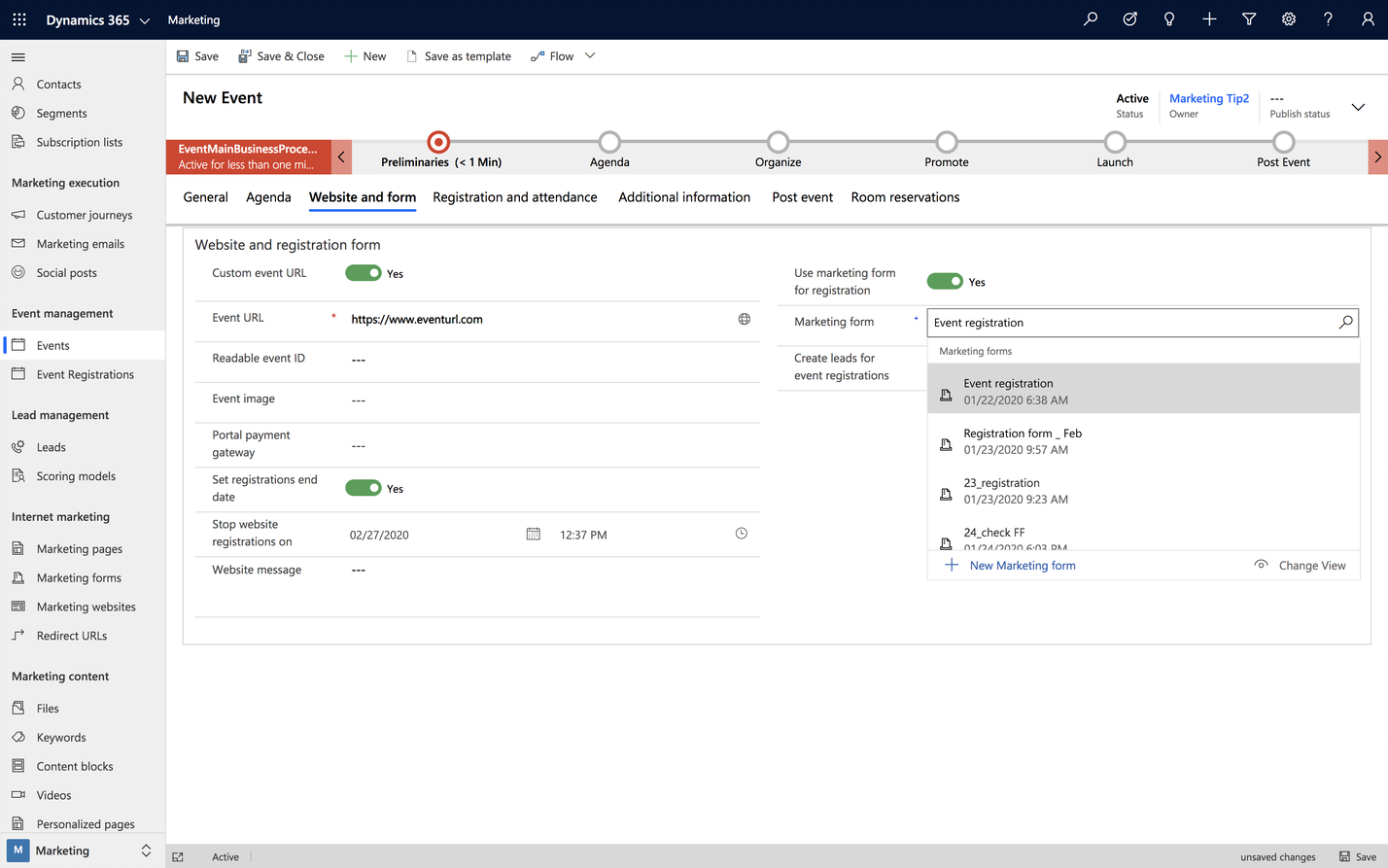
As part of an omnichannel marketing strategy, it’s good to occasionally organize events. You can utilize the module to guide you through every stage of event organization, from planning to post-event analytics. On top of that, you can use it to manage the venue where the event is taking place as well as the logistical issues related to that event.
Lead Scoring Model
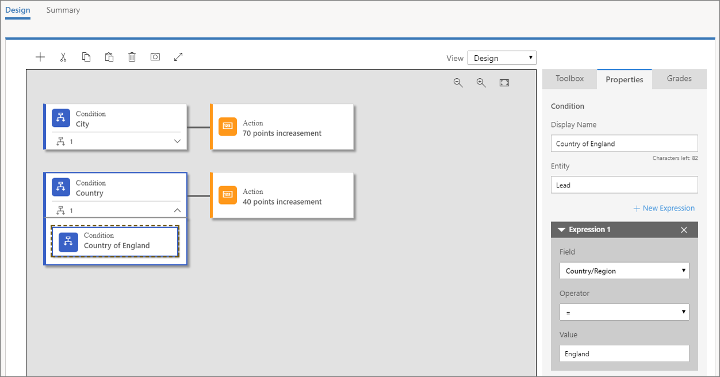
Microsoft Dynamics 365 Marketing also provides automated lead scoring capabilities. You can automatically score leads according to how active and how engaged they are with your business. All you need to do for that is to set up a number of rules for the module to follow when scoring; for example, you can tell the module to add 10 points to the lead score when they open an email you sent. In the end, you can assign names to certain lead categories with the help of the scoring system: for instance, Cold Lead (0-50 pts), Warm Lead (50-75 pts), Hot Lead (75-100 pts).
Marketing Templates
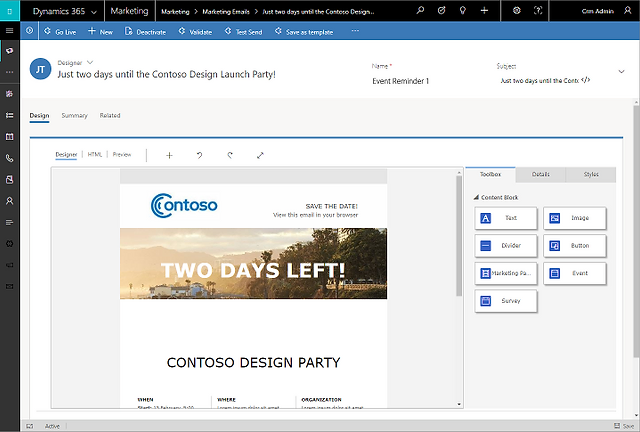
Another crucial time-saving feature is the ability to create high-quality reusable marketing templates. You will be able to have your own asset library, be it landing pages, whitepapers or emails. You’ll only need to make small tweaks in your materials as you go from one campaign to another, and then distribute the assets to relevant target audiences.
Social Post Scheduling
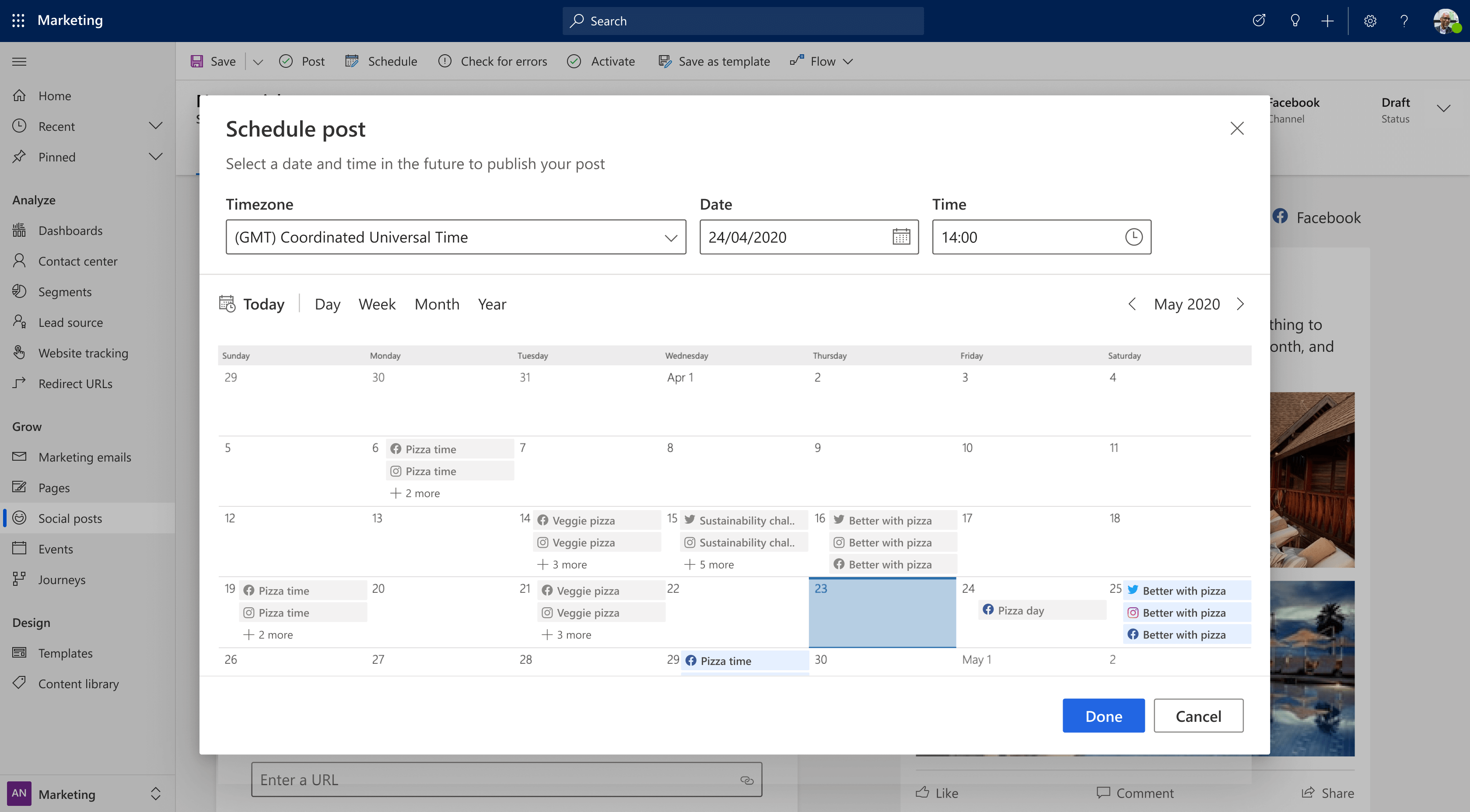
Consistency and regularity is vital for social media activity, and the module helps achieve it. Create a number of social media posts in one session and then simply schedule them to be published at a later time, one after another. However, make sure that your content will still be relevant at the time of posting.
With help from professional Microsoft Dynamics 365 consultants, you can also take advantage of the platform’s high programmability. The MS Dynamics 365 marketing tool has a robust software development kit for this purpose, allowing you to further extend and customize its functionalities. That said, this CRM is truly progressive, fitting perfectly with the specific needs and demands of a wide range of businesses, yours included.
Dynamics 365 Marketing Module Business Benefits
Some of the most valuable benefits of Dynamics 365 Marketing implementation are as follows:
Better Productivity
The most obvious and substantial benefit comes from automating a vast range of manual tasks. With less time spent on monotonous operations, employees can dedicate more of their efforts on more complex business critical tasks, increasing productivity.
Fewer Errors
Task automation also means that any human errors connected with performing those tasks are eliminated. On top of that, the module itself is built to provide robust and consistent performance, making software errors extremely rare.
Improved Customer Engagement
Account-based marketing is what Dynamics 365 Marketing does best. It provides features that enable personalized customer experiences, keeping customers engaged with your business. You can build targeted customer journeys, add customer-specific data to emails, or connect the module with Dynamics 365 Customer Insights.
Higher ROI
Maintaining the Dynamics 365 Marketing module may seem like added costs for your business. However, with the implementation of the module, you should expect higher ROI numbers. The module provides specialists with vital market and customer data, allowing them to make better informed decisions and make campaigns more efficient.
Transforming Customer Journeys with the Microsoft Dynamics 365 Marketing Tool
Like many others, you probably believe that “customer journey” is an imaginary concept which is not true. With the proper use of Dynamics 365 for marketing – through robust data generation and analysis models – customer journeys have become actionable elements that help you determine your business actions.
Dynamics 365’s customer engagement metrics give you clear and accurate insights on what your customers want, how they make choices, and even what they dislike. In turn, you can not only offer more relevant services/products but also create a more desirable customer journey. Thus, personalization – the mantra for today’s businesses – becomes highly achievable when using Dynamics 365 for marketing.
How Dynamics 365 Helps Marketing Automation
Marketing automation, as a whole, encourages greater involvement of the customers in the marketing process. Through a range of digital channels, you can now collect real-time feedback from customers, while integrating the same with your campaigns. Furthermore, this gives important data sets for your company’s production teams, especially if you are a software-oriented brand.
That said, the following are some ways in which the Dynamics 365 marketing tool allows you to automate your key processes:
- A Unified Data Bank. One of the most important features of using Dynamics 365 for marketing its ability to work within Microsoft’s vast app-based ecosystem. It gives you access to a collective data bank, thus enabling highly streamlined and interoperable business processes, real-time sync, as well as a unified interface experience across platforms and verticals.
- Data Mining. The Dynamics 365 marketing tool is a perfect platform to manage all of your business and customer data in one place. This gives you a 360-degree view of multiple data sets from multiple sources, fostering better decision-making.
- Streamlining Trust & Truth. Imagine a system with seamless data-sharing across verticals – a single source of truth for the entire business. MS Dynamics 365 gives you the opportunity of breaking through organizational barriers and providing relevant and predictive customer journeys.
- Accurate Insights. With continuous business and customer data collecting, the MS Dynamics 365 marketing tool provides accurate and relevant insights. While offering endless scope for boosting a company’s performance with AI-driven insights, lead scoring, and custom dashboards, it fosters well-informed decision making.
- Unifying Sales with Marketing. After all, marketing efforts are worthless unless they convert into sales – generate leads with marketing and nurture them with sales. Using Dynamics 365, you can easily integrate your sales and marketing teams, thus boosting ROI.
- Stricter Compliance. While connecting the marketing process with existing apps and services, Dynamics 365 ensures compliance with accessibility guidelines and GDPR regulations using built-in privacy features.
Final Thoughts
In general, marketing automation involves a set of tools that automate, streamline, and simplify repetitive and time-consuming processes. This, as is self-evident, should be something that modern-day businesses want. As with most other business aspects, Microsoft has a robust toolkit for this purpose – the Dynamics 365 marketing tool.
Indeed, this platform is taking marketing automation to new heights and making it highly relevant even for small and medium businesses. Among other aspects, the Dynamics 365 customer engagement analytics gives marketers in-depth, AI-driven insights into their customers’ demands and needs. Leveraging these, you can create better quality, greater relevance, reduced costs, and ultimately, more ROI for your business.
Lastly, with help from a reliable Microsoft Dynamics 365 consultant such as OMI, you can widely expand the platform’s scope by using its vast software development and customization toolkit. In all, Dynamics 365 is a platform that can truly transform the future of how you conduct your business.
Get in touch with the OMI experts today to discuss how we can help you with integrating MS Dynamics 365 into your company’s IT stack to get your business to a new level.
